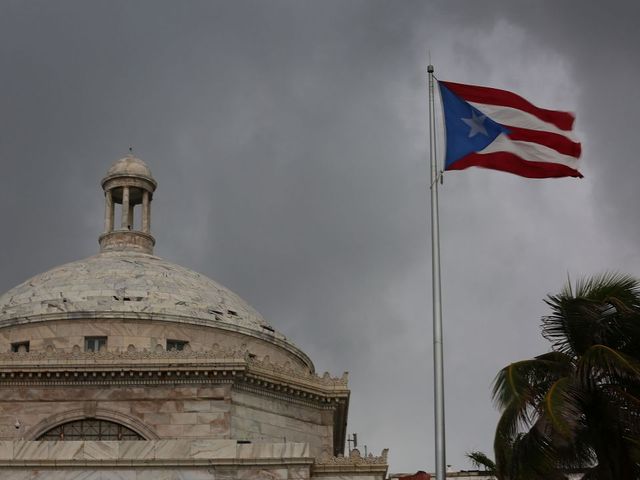Previous post

If you look at just the vote totals, it could seem overwhelming. In the vote for statehood, 97% of Puerto Rico voters who cast a ballot voted to become a state.

Well, that’s not quite the full picture.
As of 7 p.m. ET, the island’s election commission (CEE in Spanish) had reported that about 23 percent of the island’s eligible voters had cast ballots, or about 500,000 votes. About 97 percent of the votes were for statehood.
The population of Puerto Rico is about 3.6 million, so 500,000 votes is hardly representative of the mood of the voters. Especially when you consider the agenda of the current governor.
The island’s’ governor, Ricardo Rosselló from the New Progressive Party (PNP in Spanish), along with his government, had been pushing for a “yes” for statehood as the best way to grapple with Puerto Rico’s crippling $73 billion debt.
But the island’s other two main political parties had pushed for a boycott of the plebiscite, and it showed in the turnout numbers. About 1.3 percent voted for the current commonwealth status and about 1.5 percent voted for independence.
Did I mention that this statehood vote was a nonbinding referendum? This was essentially a very expensive opinion poll, with less than a quarter of registered voters showing up. That is not going to stop Governor Rossello, who has vowed to “create a commission” to begin to lobby for statehood. Statehood, or any change in Puerto Rico’s status, would have to be approved by Congress. And Congress is highly unlikely to pick up the price tag on a new state with a stagnant economy, even if the federal tax base was expanded.
Many believe the island’s territorial status has contributed to its 10-year economic recession, which has prompted nearly half a million Puerto Ricans to flee to the U.S. mainland and was largely sparked by decades of heavy borrowing and the elimination of federal tax incentives.
Puerto Rico is exempt from the U.S. federal income tax, but it still pays Social Security and Medicare and local taxes and receives less federal funding than U.S. states.
We have covered Puerto Rico’s debt problem before, and yes, the hole they are in is deep. Statehood would not change that, because states can’t declare bankruptcy either. Puerto Rico went to court back in May to declare as much bankruptcy as they could under the law.
Puerto Rico’s case will be the first ever heard under a federal law for insolvent territories, called Promesa, which was enacted last summer; the Obama administration had warned that a “humanitarian crisis” would ensue if Puerto Rico were not given extraordinary powers to abrogate debt. There is no existing body of court precedent for Promesa, but the island’s creditors — who range from hedge fund managers to mom-and-pop investors — are bracing for a titanic battle.
The coming court proceedings will not be formally called a bankruptcy, since Puerto Rico remains legally barred from using Chapter 9, the bankruptcy route normally taken by insolvent local governments. Instead, Mr. Rosselló petitioned for relief under Title III of the Promesa law, which contains certain Chapter 9 bankruptcy provisions but also recognizes that, unlike the cities and counties that use Chapter 9, Puerto Rico is not part of any state and must in some ways be treated as a sovereign.
What Rossello was hoping to do, with this vote, was get a strong tide of voter backing for statehood in order to negotiate a better bankruptcy deal – or to get Congress to restructure their debt, or simply bail them out. The spin of “97 percent want statehood” is pretty good, but will neither hold up under scrutiny or impress Congress.
Hmm.. seems a it’s time to grant them independence, and let them figure this crap out on their own… their “socialism light” has worked so well so far, let them have the full on version… then give it two years, and they’ll be begging to come back…but at least if they’re no longer a territory, it’ll be harder for them to bring their problems here…
But the island’s other two main political parties had pushed for a boycott of the plebiscite
Before they even think about joining the USofA, they need to get this crap out of their heads and out of their political playbooks. In a republic, boycotting a vote just means that you don’t even have a chance of winning. Boycotting doesn’t get the vote overturned or make it “illegitimate”. You either suck it up and play, or you go home as a forfeit.
Many believe the island’s territorial status has contributed to its 10-year economic recession
And how in the world does that logic play out? Huh? Wait, 10 year economic recession. Gee what might have happened a little more than 10 years ago (13, to be exact)? Yeah, that’s right, they told the US to go to h-ll and shut down Roosevelt Roads naval base. Hmmmm……..
largely sparked by decades of heavy borrowing and the elimination of federal tax incentives
Gee, I wonder what the heavy borrowing was for? Maybe for typical socialist bullcrap? And those “tax incentives” should be read as “discounts for Puerto Ricans and the burden placed on the 50 states.”
It’s always “we don’t understand why our socialist utopia never came into full flower!” And never “maybe socialism, itself, is the problem.” And, of course, the kleptocracy down there, too. (Which also always seems to be a bug in the socialist machine.)
or simply bail them out
Yep, there’s the real answer. They want more OPM to pay their bills.
Best answer to their bankruptcy problem, imho? Let Americans (and their companies) buy bits and pieces of PR, tax free, regardless of current ownership. Use that money to pay off the creditors. *Then* we can figure what to do with all that land owned by Americans……….
Oh great. Another democrat ghetto crap hole.
4 Comments